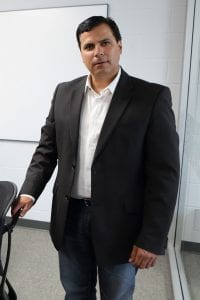Grad profile: Darrell Brown (International Business, 1998)
 Darrell Brown took the exact opposite path most kids dream of: he sold his arcade business and went back to school.
Darrell Brown took the exact opposite path most kids dream of: he sold his arcade business and went back to school.
But the 47-year-old graduate of Red River College’s International Business diploma program (1998) hasn’t looked back, first founding a marketing company to connect European tourists with Manitoba First Nations, then a manufacturing company preparing office furniture orders for First Nations and government clients.
“I’m in business to make clients happy,” says Brown. “That, to me, is where it’s not about profit. It’s about delivering a good product or service.”
With a father in the army, Brown experienced the typical “base brat” upbringing, moving a number of times during his childhood, including two tours in Germany. His father’s final posting brought the family to Winnipeg, where Brown graduated high school, then worked for a major Crown corporation for 10 years.
It wasn’t a great fit.
“I didn’t care for the union mentality,” he says. “Toward the end of my time there, the company was offering buyouts during a two-week window and they accepted me. I took my meagre buyout, cashed in a boatload of RSPs and found a business to buy… Basically I was doing everything to make it happen.”
Brown’s arcade business, stocked with pinball machines and pool tables, had 15 locations at the height of its popularity. But this, too, wasn’t the fulfilling career he had envisioned. He wanted to take his career in a larger, more meaningful direction; one that tied in his native heritage. That’s when he found the International Business diploma at RRC. He sold the business and hit the books.
“The classes were really good but fairly intense,” Brown says. “You had to be immersed in it or you wouldn’t make it.”
Brown studied different aspects of what makes the world economy spin – macro economics, geopolitics – as well as such business basics as accounting and marketing. The program brought in international lecturers and guests from the local business community while also sending the students out to volunteer at various chambers of commerce.
In his final year, Brown got sent even farther – back to Germany for a one-month practicum based on his goal of founding a business to export native art. While he enjoyed the trip – meeting local business people through the Canadian embassy and enjoying Frankfurt’s gigantic trade fairs – he concluded authentic native art would have a tough time competing with less expensive knockoffs that were infiltrating the market.
But if conditions weren’t right to export art, he could always try importing tourists. He founded Kisik Marketing to do just that.
“I worked with clients to get communities’ tourism ready… I was trying to help First Nations that are underdeveloped be tourism ready and connecting them with clients while maintaining their state of readiness. The Canadian government, Tourism Canada would not recognize a First Nation until they met certain standards.”
Brown says he enjoyed working with the communities, but it was difficult to keep them at the tourism-readiness status the government demanded. Kisik Marketing started to slide onto the backburner as a new interest captivated Brown’s time and energy.
When he attended Aboriginal Chamber of Commerce meetings and went to native conferences, Brown heard from colleagues about native procurement policies that different levels of government had put in place to encourage native business growth. The policies basically commit a certain amount of purchasing dollars to native-owned businesses. After researching one of the big areas of government purchasing – office furniture – for a year, Brown dove in.
“I thought I would build my business selling to the government,” Brown says about Kisik Inc., “but I actually built it up selling to native clients first. Now after I’m established, I’m starting to sell to the federal government.”
Brown says the early years of Kisik were tough going, with thin profit margins on orders made chancier by the uncertain state of Manitoba’s northern roads. But cash flow and business contacts slowly grew, to the point where just recently, Kisik bid on a major government contract outside the native procurement quota and won, biting off a challenge Brown says he is “cautiously happy” for.
Through his tacks in career path and building Kisik Inc., Brown says he’s tried to live the traditional teachings of honesty, respect and humility – virtues he says he witnessed when his volunteer experiences brought him into contact with elders in the native business community.
“If you keep them in your mind as you go about your day, that helps you be a better person… Some business people are so driven, about getting to the bottom line. I’ve always found when you start your conference or meeting with a blessing from an elder, it sets a good tone.”
Profile by Matt TenBruggencate (Creative Communications, 2013)
